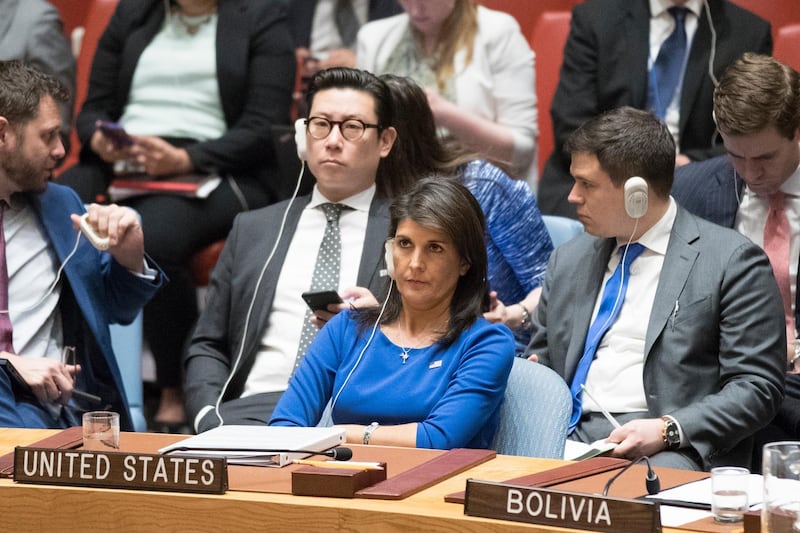The Trump administration on Monday appeared to have reconsidered immediately imposing new sanctions on Russia that would have targeted companies providing the Syrian regime with military equipment or material for chemical weapons.
"We are considering additional sanctions on Russia and a decision will be made in the near future," White House spokeswoman Sarah Sanders said.
Sarah Sanders on Russian sanctions: "We are considering additional sanctions on Russia and a decision will be made in the near future."
— Andrew Beatty (@AndrewBeatty) April 16, 2018
The United States envoy to the United Nations, Nikki Haley, had said the day before that sanctions would be announced on Monday, following US-led missile strikes on Syrian President Bashar Al Assad's chemical weapons facilities at the weekend.
"Russian sanctions will be coming down, [Treasury] Secretary Mnuchin will be announcing those on Monday if he hasn't already, and they will go directly to any sort of companies that were dealing with equipment related to Assad and chemical weapons use," Ms Haley said on CBS programme Face the Nation on Sunday.
She said the sanctions would be part of a deterrence message that the US is sending Russia and Iran on chemical-weapons use in Syria.
Earlier this month, the US sanctioned state-owned Russian arms agency Rosoboroneksport, accusing it of arming Mr Al Assad.
The delay in announcing new sanctions suggest that either the Trump administration may be slowing down the process while considering other steps or that Ms Haley misspoke on Sunday.
These deliberations may include a new draft resolution submitted at the UN Security Council on Monday, sponsored by the US, France, and Britain – the three countries that carried out the missile strikes on Saturday.
_______________
Read more:
[ British diplomats say Russia keeping chemical inspectors out of Douma ]
[ Ambassador Haley: US will stay in Syria until it secures goals ]
_______________
The resolution proposes "to establish an independent mechanism based on the principles of impartiality and professionalism to investigate the use of chemicals as weapons in the Syrian Arab Republic", according to a draft copy obtained by The National.
It also requests the UN secretary general, in co-ordination with the head of the Organisation for the Prohibition of Chemical Weapons, "to submit to the Security Council, within seven days of the adoption of this resolution, recommendations, including terms of reference, to the Security Council, and to identify to the greatest extent feasible individuals, entities, groups or governments who were perpetrators, organisers, sponsors or otherwise involved in the use of chemicals weapons, including chlorine or any other toxic chemical, in the Syrian Arab Republic”.
It also calls for unfettered access to the town of Douma, the site of the chemical-weapons attack that triggered the western retaliation, which OPCW inspectors were barred from visiting on Monday by Russia and the Syrian regime for “security reasons”.
The discussions on the draft are expected to continue during the week. Russia, which vetoed a similar resolution last week, may reject this one as well, even though it also calls for a political solution in Syria.
The White House is seeking a carrot-and-stick approach with Russia on Syria. According to the Wall Street Journal, it was US President Donald Trump who opted for a more restrained military option in carrying out the strikes on Saturday.
Following at least four meetings at the White House last week, Mr Trump “agreed on one of the most restrained of the military-strike options crafted by the Pentagon”, launching 105 missiles at the Syrian regime's chemical-weapons targets.
Defence Secretary James Mattis had presented the "White House with three military options", according to the WSJ.
“The most conservative option would have hit a narrow set of targets related to Syria’s chemical-weapons capabilities,” it said.
The second included “strikes on a broader set of Syrian regime targets, including suspected chemical-weapons research facilities and military command centres”, the paper said.
The most expansive proposal would have hit Russian provided air defences in Syria and “was designed to cripple the regime’s military capabilities without touching Mr Assad’s political machinery”.
Mr Trump chose a combination of one and two after Ms Haley and John Bolton, the president's new national security adviser, argued for stronger measures and Mr Mattis urged more-limited strikes.







